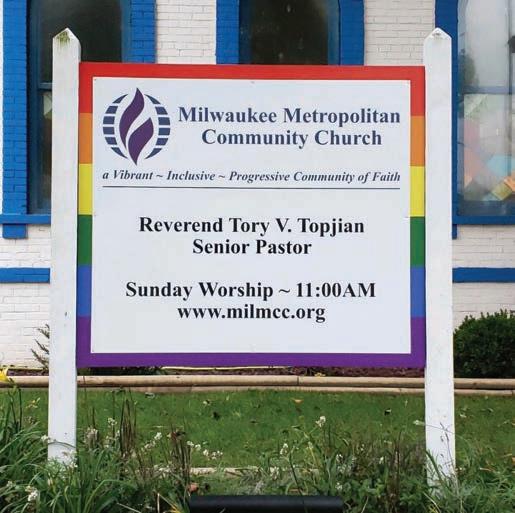
4 minute read
Milwaukee Metropolitan Community Church Celebrates
Milwaukee Metropoliłan Communiły Church Celebrates 50 Years
BY PAUL MASTERSON
As the LGBTQ liberation movement began to mobilize in response to the Lavender Scare of the 1950s, the community’s infrastructure from athletics to political advocacy and healthcare developed as well. Spirituality, too, would be addressed. For some LGBTQ Christians, the alternative to enduring oppressive condemnation from the pulpits of their mainstream churches would be to form their own, ones based on purer values of acceptance, compassion, love and social justice.
Founded in 1968 by Troy Perry, a Baptist minister defrocked because he was gay, the Universal Fellowship of Metropolitan Community Churches addressed the spiritual needs of those LGBTQ individuals who sought positive Christian fellowship. In 1971, a Milwaukee congregation, Prince of Peace Metropolitan Community Church, was organized under the leadership of Reverend Paul W. Sydman. Over the following two decades, the church went through various periods of growth, contraction, and reorganization, frequently changing venues for its worship services as well as name changes of the church itself. A number of pastors and co-pastors came and went with lay parishioners filling the void when necessary.
Over the years MCC developed a broad range of programs that address the spiritual and other community needs. These include community and congregational support, HIV/AIDS and




prison ministries, and a Trans ministry. MCC’s Helping Hands Ministry works with various organizations like Vivent Health and Courage MKE supporting their efforts through donations and volunteerism.
ANGELS OF HOPE
Notable pastors include Rev. David Callentine who became MCC’s pastor in November of 1986. A regular contributor to Milwaukee’s LGBTQ newspaper, Wisconsin Light, Rev. Callentine was known for managing concurrent dual pastorships upon the charter of a new UFMCC church, Angels of Hope, in Green Bay (it celebrates its 35th anniversary this year). Callentine presided over worship in both churches, each Sunday shuttling from Milwaukee to Green Bay and back again. He died of complications due to HIV/AIDS in 1988.
Rev. Lewis Broyles became pastor in 1993. His tenure brought closer ties between the MMC and the greater Milwaukee community. As a member of the PrideFest Task Force, acting chairman of the board of SAGE (Services and Advocacy for LGBTQ Elders), board member of the Holiday International Bowling Tournament (HIT) and host of a cable access TV program, “Gay by God’s Will,” Broyles became a well-known and highly respected personality. He also made history blessing committed same-gender couples decades before marriage equality became the law of the land in 2015.
It was under Broyles that the Milwaukee MMC becomes the city’s (and the state’s) first LGBTQ entity to purchase property, a front gabled house built in 1880 and located at 1239 W. Mineral Street in Walker’s Point. The purchase was celebrated by a grand dedication service.
Broyles died suddenly in 2005 and was succeeded by Rev. Wendy Woodruff the next year. While her pastoral style is not as publicly engaged as her predecessor’s, MCC carried on and was able to pay its mortgage in full in 2011. A celebratory burning of the mortgage marked a historic moment for the church and for Milwaukee’s LGBTQ community.
VIGILS AND COUNSELING
Following Woodruff’s resignation in January 2016, Rev. Tory Topjian was appointed the congregation’s pastor, beginning his pastorate in June. Within days, on the Sunday of Milwaukee’s PrideFest weekend, the Pulse Night Club shootings in Orlando, FL, shook the LGBTQ community nationwide. Along with other local faith leaders, Topjian helped lead the Greater Milwaukee area’s LGBTQ faithful in vigils and grief counseling. Since then, he raised MCC’s profile to build his congregation, developing outreach and cooperative programs with various LGBTQ organizations. Coping with the COVID-19 pandemic, MCC reverted to a virtual presence. It has since returned to in person services.
Over the decades, mainstream churches began to rethink their positions towards LGBTQs, making tentative steps towards accepting them within their congregations. However, their welcome would often be conditional and based on a “love the sinner, hate the sin” compromise. Some faced internal struggles with factions in support of accepting the realities of sexual identity that others opposed. The United Methodist Church now faces a schism over matters of doctrine, in particular same-sex marriage.
Still, for many, MCC’s Christian theology, buttressed by its focus on social justice and an embrace of LGBTQ inclusion, provides a spiritually and emotionally supportive locus that other denominations do not.
As Milwaukee’s oldest continuously functioning LGBTQ organization, the Metropolitan Community Church now celebrates its golden anniversary and continues to fulfill its mission of providing a vibrant, diverse and inclusive faith community that welcomes everyone.

Paul Masterson is an LGBTQ activist and writer and has served on the boards of the Milwaukee Gay Arts Center, Milwaukee Pride, GAMMA and other organizations.










